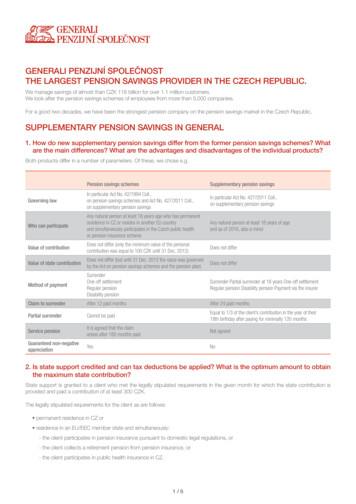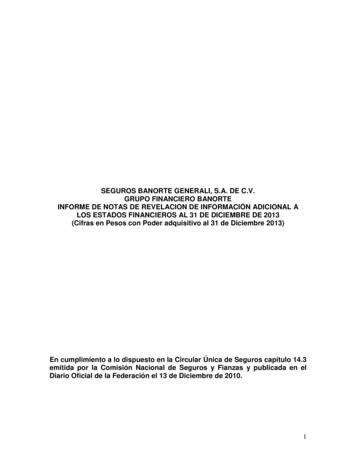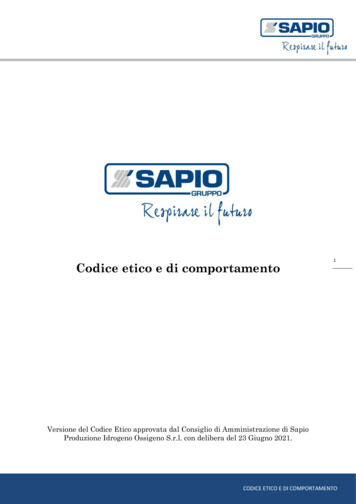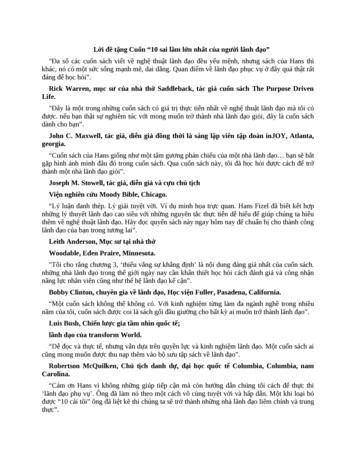
Transcription
GENERALI PENZIJNÍ SPOLEČNOSTTHE LARGEST PENSION SAVINGS PROVIDER IN THE CZECH REPUBLIC.We manage savings of almost than CZK 118 billion for over 1.1 million customers.We look after the pension savings schemes of employees from more than 5,000 companies.For a good two decades, we have been the strongest pension company on the pension savings market in the Czech Republic.SUPPLEMENTARY PENSION SAVINGS IN GENERAL1. How do new supplementary pension savings differ from the former pension savings schemes? Whatare the main differences? What are the advantages and disadvantages of the individual products?Both products differ in a number of parameters. Of these, we chose e.g.Pension savings schemesSupplementary pension savingsGoverning lawIn particular Act No. 42/1994 Coll.,on pension savings schemes and Act No. 427/2011 Coll.,on supplementary pension savingsIn particular Act No. 427/2011 Coll.,on supplementary pension savingsWho can participateAny natural person at least 18 years age who has permanentresidence in CZ or resides in another EU countryand simultaneously participates in the Czech public healthor pension insurance schemeAny natural person at least 18 years of ageand as of 2016, also a minorValue of contributionDoes not differ (only the minimum value of the personalcontribution was equal to 100 CZK until 31 Dec. 2012)Does not differValue of state contributionDoes not differ (but until 31 Dec. 2012 the value was governedby the Act on pension savings schemes and the pension plan)Does not differMethod of paymentSurrenderOne-off settlementRegular pensionDisability pensionSurrender Partial surrender at 18 years One-off settlementRegular pension Disability pension Payment via the insurerClaim to surrenderAfter 12 paid monthsAfter 24 paid monthsPartial surrenderCannot be paidEqual to 1/3 of the client’s contribution in the year of their18th birthday after paying for minimally 120 monthsService pensionIt is agreed that the claimarises after 180 months paidNot agreedGuaranteed non-negativeappreciationYesNo2. Is state support credited and can tax deductions be applied? What is the optimum amount to obtainthe maximum state contribution?State support is granted to a client who met the legally stipulated requirements in the given month for which the state contribution isprovided and paid a contribution of at least 300 CZK.The legally stipulated requirements for the client as are follows: permanent residence in CZ or residence in an EU/EEC member state and simultaneously:- the client participates in pension insurance pursuant to domestic legal regulations, or- the client collects a retirement pension from pension insurance, or- the client participates in public health insurance in CZ.1/6
The value of state contribution is stipulated: for client contributions equal to 300 - 999 CZK it is 90 CZK and 20% of the amount exceeding 300 CZK, and for contributions of 1000 CZK or more it is 230 CZK.The value of state support for the client’ contribution variants is shown in the following table:Value of state contributionClient’s monthlycontribution in CZK1002003004005006001000150020003000State’s monthlycontribution in CZK--90110130150230230230230230 Annual income taxdiscount in CZK-------90018003600Total annual benefitfrom the state in CZK--10801320156018002760366045606360It is evident from the table that the optimum amount to obtain the maximum state contribution is 1000 CZK.If the client’s monthly savings exceed 1000 CZK, the resources paid in excess of this amount are deductible from the personal incometax base. However, maximally up to 24,000 CZK, even if the highest state contribution is not collected. Simply pay the amount of the taxdeduction and a contribution for December up to 1000 CZK.3. Remuneration, fees and differences between them?Remuneration is paid from the assets in the subscriber fund, whereas its consists of remuneration for managing fund assets andremuneration for appreciation of fund assets. The remuneration is used to cover all the costs paid by the pension company in connectionto its business in retirement and supplementary pension savings for third parties.In addition to remuneration, by law the pension company is also entitled to one-time fees from the subscriber, e.g. for change of strategyand so on.The sum of all the fees and remuneration is available in the pricelist of fees and remunerations of Generali PS.4. What does it mean that positive appreciation is not guaranteed? (Can I lose all my saved money?)Given the unforeseeable fluctuations on financial markets, there may be changes in the value of managed assets, and thus the value ofthe Unit may rise and fall and the return on invested resources is not always guaranteed. Nevertheless, given the long-term nature of theproduct (the client saves for ten, twenty or more years), portfolio diversification (resources are invested into a wide range of investmentassets and the price of all assets at one moment in time cannot be expected) and the caution and active management of the pensioncompany, it is highly unlikely that the client would lose all their saved assets.5. Account number, payment symbolsPayments to supplementary pension savings must be sent as follows: Client’s contribution- Account number 840111280/2700- The variable symbol is the client’s personal number (insurance number in the case of foreigners)- The specific symbol is the contract number Employer’s contribution- Account number 840111280/2700- The variable symbol is 00 employer’s ID number- The specific symbol is the client’s personal number (insurance number in case of foreigners)2/6
Payment of contributions from abroad- Name and address of bank: UniCredit Bank Czech Republic and Slovakia, a. s., Želetavská 1525/1, 140 92 Prague 4- Account number 840111280/2700- IBAN - CZ1027000000000840111280- SWIFT (BIC) - BACX CZ PPContributions must be sent so that they are credited to the pension company’s account by the end of the given calendar month.Payments to supplementary pension savings may be sent as bulk payments. A bulk payment refers to the payment of contributions forall employees in the given fund at one as one sum. The condition for allocating a code for bulk payments is a minimum of 10 payments.6. Information for employersThe employer’s contribution to supplementary pension savings is a tax-eligible cost for the company in unlimited amount, if regulatedby a collective agreement, employment contract or the company’s internal regulation. Neither the company nor the employee pay socialand health insurance from contributions of up to 50,000 CZK per year (total limit for contributions to pension savings and life insurance).Moreover, the contribution to pension savings of up to 50,000 CZK is exempted from income tax for the employee (if the employer doesnot contribute to life insurance).CONCLUSION OF A 3RD PILLAR CONTRACT1. What are the conditions for joining the 3rd pillar?Based on the contract signed with the pension company, the subscriber to supplementary pension savings may only be a natural person,without restrictions on age (until the end of 2015, only 18 years of age or more), who simultaneously does not save in a transformed fundwith any pension company (under a pension savings scheme contract concluded before 1 Dec. 2012).2. It is possible to arrange disability, service and inheritance pension?Pensions as such are not arranged, but the law allows for the selection of the respective similar allowance (disability pension Section 22;inheritance pension Section 24). Service pension is not supported by the Act on supplementary pension savings3. Is transfer from a transformed to a subscriber fund possible?The transfer of resources from a transformed fund (pension savings scheme) to a subscriber fund (supplementary pension savings) ispossible within the same company. If the client has several contracts in the transformed fund, they must first be merged into one contract,or the other contracts must be settled.COURSE OF SAVINGS IN THE 3RD PILLAR1. Can I change the value of the contribution, or interrupt regular saving?Yes, in the supplementary pension savings system, it is possible to increase or reduce contributions by amending the contract, whereasthe client can report the increase of subscriber contributions via telephone to the customer help line. Due to the impact on drawing statecontributions, decreases of the contribution are accepted only in writing.Furthermore, it is possible to defer or interrupt the payment of contributions due to unexpected complications (e.g. the client can notsave for the time being).The condition for deferral is its written agreement with an effective date in the future, but no earlier than from the 1st day of the followingmonth after delivery of the request. The maximum deferral period is 12 months and the contributions must be repaid at latest within 6months from the end of deferral. The deferral period for which the client pay contributions retroactively is included in the saving period,but state contributions cannot be collected for these retroactively paid contributionsThe interruption of savings is effective from the date specified by the client in the written notice, but at earliest from the 1st day of thefollowing month after delivery of the request. The period of interruption of paying contributions is not included in the savings period.3/6
2. Can an employer or other person contribute?Yes, the supplementary pension savings system allows contributions from the employer, if the subscriber to savings agrees, whereasthe subscriber is obliged to inform the pension company of this fact beforehand in writing. A state contribution is not provided for theemployer’s contribution. Contributions from third parties are not permitted within supplementary pension savings.3. Can savings be transferred to another company in the course of savings?Yes, if the supplementary pension savings expired, the client requested this transfer and concluded a new contract with another pensioncompany. The pension company may charge a fee of maximally 800 CZK for the transfer. With the request to transfer the resources, theclient is obliged to submit consent from the pension company to which the resources are to be transferred. The actual transfer must becarried out within 1 month from the expiry of the supplementary pension savings. The savings period is accumulated for the subscriberin the case of transfer.SAVINGS FOR CHILDREN1. Since when is it possible to arrange pension savings for children?The arrangement of “children’s pension savings” is possible since 1 Jan. 2016, and the product can be used without restriction on age.Until this date, pension savings were designated only for clients 18 years of age or more.2. Who can arrange pension savings for children?Naturally, of the child’s legal guardians. Also, any other third party such as a grandparent, if they submit power of attorney from a legalguardian (usually at least one of the parents).However, the contract for a child cannot be concluded by a parent who has been declared bankrupt by the insolvency court.3. Which documents will be needed to conclude the contract?Anybody who concludes a contract must submit their identification card. The legal guardian confirms their right to act on behalf of the childby means of an affidavit, which is part of the contract form. A third party will submit power of attorney from the legal guardian with the legalguardian’s signature. This power of attorney need not be certified by a notary, but it must be delivered to the pension company on time.In the case of a foreigner, documents proving the claim to a state contribution must be submitted - see question 2 in the sectionSupplementary pension savings in general.4. Can I conclude a contract and submit power of attorney later?Yes. However, the power of attorney must be sent to the pension company as soon as possible after signing the contract. If the powerof attorney not delivered within 14 days from signing, the contract will be cancelled.5. When can child savings be terminated?In general, it applies that the contract may be prematurely terminated no sooner than after 2 years of saving. This condition also applies tochild pension savings. In the case of premature termination, we will return all state contributions to the MF and the client will receive theirsavings and yields. However, the request must include e.g. a decision of the court - permission to terminate the contract with indicationof the date of legal force.6. When will the saved resources be available to the child?a) At 18 years of age as partial surrender, when they can collect 1/3 of the value of the client’s contributions, whereas the contractcontinues with the remaining savings.b) As surrender, when they can collect all their savings, whereas the state contributions will be returned to the Ministry of Finance andthe contract will be terminated. However, if the client is less than 18 years of age at the time of premature termination, it is necessaryto submit e.g. a court decision - permission terminate the contract with indication of the date of legal force.c) At 60 years of age as one-time settlement or a regular pension. This form of termination means collecting the state contribution, andin the case of regular pension also tax exemptions.4/6
7. What are the conditions for collection through partial surrender?There are three legal conditions which the client must fulfil simultaneously. Collection through partial surrender is possible only duringthe 18th year of age. The savings plan must have lasted at least 120 calendar months. There was no transfer from a different pensioncompany in the past 24 months.8. Is there a guarantee that the child cannot lose the invested resources?For supplementary pension savings, the guaranteed positive zero no longer applies, but if the client chooses one of the three savingsprograms, the risk of loss is negligible. All of our savings programs include a special investment brake.9. Can I as a parent apply a tax exemption on the child pension plan?No. The tax exemption may be applied only by the person for whom the contract is agreed, not the person who pays the contributions.10. Can a foreigner conclude a contract?Yes. However, to collect the state contribution it is necessary to submit documents proving the claim to a state contribution - see question2 in the section Supplementary pension savings in general.TERMINATION OF THE CONTRACTING, DRAWING THE SAVED RESOURCES1. Can savings be terminated prematurely? Under what conditions?Yes, the contract on supplementary pension savings may be terminated prematurely with surrender, which may be paid at earliest after24 months of saving. The vale of surrender is the value of the client’s resources, after deducting the state contributions which the pensioncompany will return to the state budget. During payment, the yields and received contributions of the employer are subject to withholding tax.2. How can I draw on my resources?The subscriber’s saved resources may be paid out as follows:a) one-off settlement,b) surrender,c) old-age pension for a designated period,d) disability pension for a designated period,e) payment of one-off premiums for lifetime pension,f) payment of a one-off premium for pension for a precisely stipulated period with a precisely stipulated pension value,g) pre-pension (version of old-age pension for a designated period),h) partial surrender at 18 years.3. What happens if the subscriber dies? Is it possible to designate beneficiaries? How does inheritancework?Before the claim to one-time settlement arises: In the case of death before the claim to one-time settlement or regular pension arises, the client’s saved resources are paid in theform of surrender to the designated beneficiary or heirs.After the claim to one-time settlement arises: In the case of death after the claim to one-time settlement or regular pension arises, the saved resources including state contributionsare paid to the designated beneficiary or heir (based on the decision from inheritance proceedings).If the subscriber died and was already paid the pension, the designated beneficiary is entitled to one-off settlement in the amount equalto the as yet unpaid part of the client’s resources.If a claim to one-time settlement existed and no designated beneficiary was agreed in the contract, the one-time settlement becomesthe subject of inheritance.5/6
4. When does the claim to payment arise?Requirements to terminate the contract:a) Standard termination At earliest upon reaching 60 years of age and minimally 60 duly paid months of contract duration (claim to old-age pensionand one-off settlement) At earliest five years before reaching retirement age and minimally 60 duly paid months of contract duration ( claim to prepension).b) Surrender After minimally 24 duly paid months Partial surrender after minimally 120 duly paid months, 18 years of age and no transfer from another pension company in thelast 24 months.c) Disability pension Granting of disability pension for third-degree disability and minimally 36 duly paid months of contract duration.ADMINISTRATIVE PROCEEDINGS1. Can the contract be blocked by distrainment proceedings?Yes. Pension savings may be blocked by distrainment proceeding pursuant to Act No. 120/2001 Coll., on court distrainers anddistrainment activity.2. Can a client who is registered in distrainment or insolvency proceedings terminate the contract?Yes, assuming they meet the conditions for due termination of the contract. Communication with the distrainer’s offices or insolvencytrustees is ensured by the pension company.6/6
THE LARGEST PENSION SAVINGS PROVIDER IN THE CZECH REPUBLIC. We manage savings of almost than CZK 118 billion for over 1.1 million customers. We look after the pension savings schemes of employees from more than 5,000 companies. For a good two decades, we have been the strongest pension company on the pension savings market in the Czech Republic.











